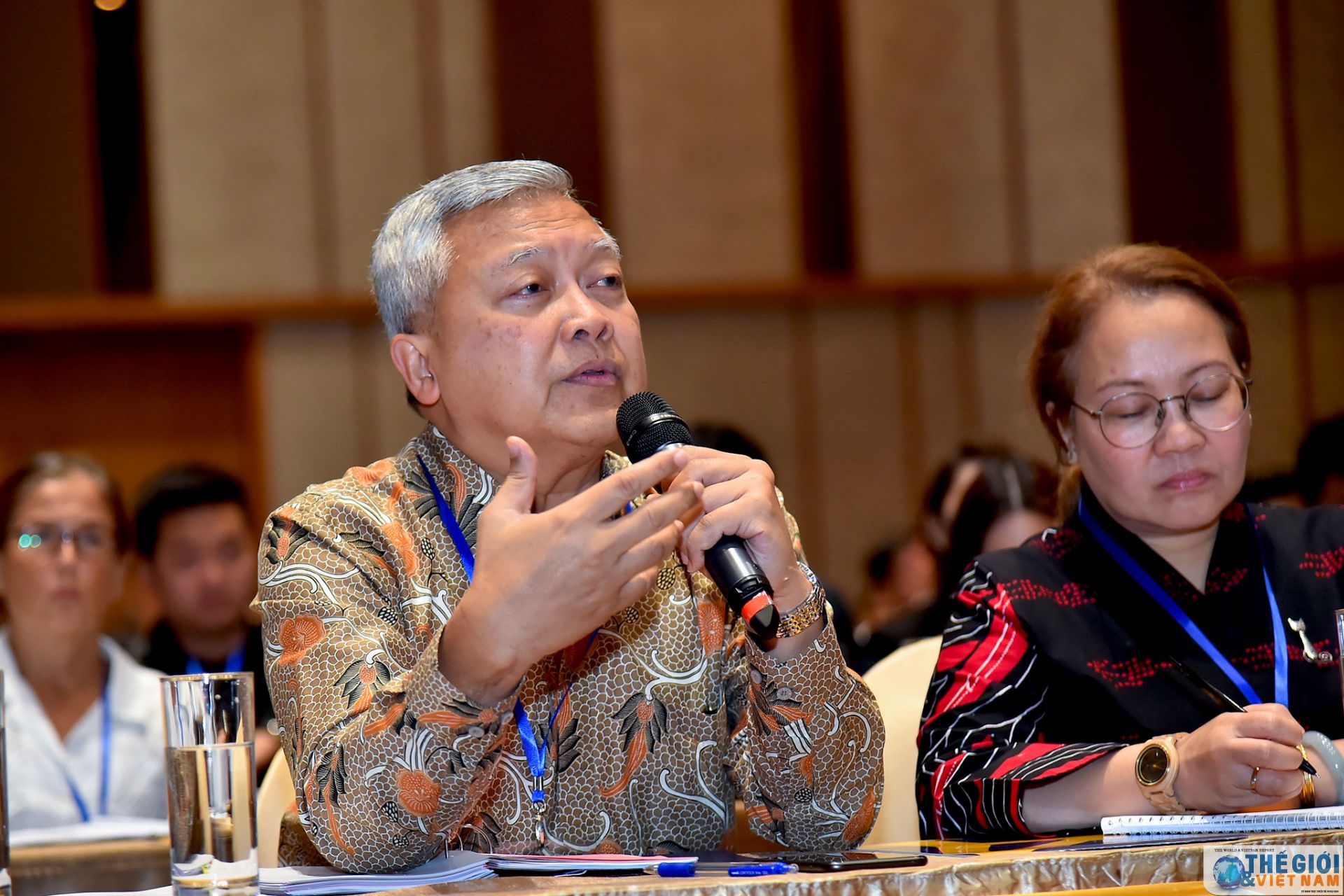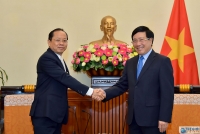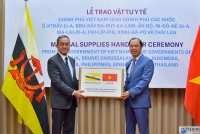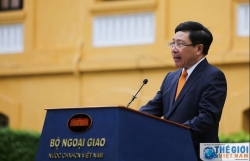
ASEAN - A key pillar of Indonesian foreign policy
Latest
| TIN LIÊN QUAN | |
| ASEAN Foreign Ministers’ Meeting set for September: Spokesperson | |
| Vietnam enjoys great benefit from ASEAN membership: Deputy Foreign Minister Nguyen Quoc Dung | |
 |
| Ambassador of Indonesia to Vietnam Ibnu Hadi. (Photo: Tuan Anh) |
Indonesia is always consistent in implementing a free and active foreign policy in the midst of dynamic global challenges where war and conflict are still ongoing in many places, the global economic growth is on a downward trend, and various humanitarian issues are still of concern. Since its establishment in 1967, ASEAN has become a major focus for Indonesia's foreign policy. It is the closest circle of the country's regional international relations. ASEAN has been and remains a key pillar of Indonesian foreign policy.
Along with other members, through ASEAN, Indonesia constructed a regional framework that is able to facilitate cooperation in political, economic, and socio-cultural aspects, manage intra-ASEAN conflict, and formulate common and shared positions toward perceived potential external threats. Indonesia will continue to support ASEAN in playing a central role in the promotion of peace, stability and, prosperity in the region. A peaceful and stable region will attract positive cooperation and give more benefits to the countries within the region. Indonesia is also keen to see the unity of ASEAN and its continuing centrality in various regional and international affairs.
In accordance with the statement of the Minister of Foreign Affairs of the Republic of Indonesia regarding the priorities of Indonesia's foreign policy in 2019-2024, ASEAN is still the cornerstone of Indonesia's foreign policy. The biggest challenge that will be faced by ASEAN in 2020 onward concerns with how ASEAN can stay relevant and maintain its main role in the international arena. Indonesia consistently attempts to make ASEAN people feel the benefits of ASEAN more and encourage ASEAN to be more adaptive to carry out reforms to ensure the efficiency and effectiveness of the organization including in its decision-making process.
Furthermore, ASEAN relevance can be achieved and maintained when our community has a deep understanding and awareness of ASEAN. Indonesia is actively promoting the Narrative of ASEAN Identity. By defining an identity that represents similar values and traditions within the region of ASEAN, ASEAN member states will have common denominators that serve as a self-reminder regarding who we are, where we come from, and where we are going, both as a community as well as an organization. I surely hope that the Narrative of ASEAN Identity could be adopted by ASEAN leaders during the next ASEAN Summit in Viet Nam.
Apart from bringing the benefit to the people, the relevance of ASEAN should bring benefits to the region and the world. ASEAN needs to also contribute to overcoming various economic, trade and security problems both regionally and globally. On economic issues, when we work together within the ASEAN framework, we need to not only focus on the cooperation built with developed countries, but also to assist member countries such as Myanmar, Lao PDR and Cambodia to be on the right track to reach their development objectives.
In addition, ASEAN must also continue to come up with innovations and step out of its comfort zone to effectively respond to current challenges. At the 34th ASEAN Summit in Bangkok in 2019, ASEAN leaders adopted the ASEAN Outlook on the Indo-Pacific that will serve as the guideline for ASEAN to establish its engagement in the Asia-Pacific and the Indian Ocean regions. This outlook is intended to enhance ASEAN centrality as the underlying principle for promoting cooperation with ASEAN-led mechanisms as platforms for dialogue and implementation of the Indo-Pacific cooperation. It will put forward several main areas of cooperation namely maritime cooperation, connectivity, and UN Sustainable Development Goals 2030 as well as economic and other possible areas of cooperation.
In the upcoming years, Indonesia will focus on several aspects. The first aspect is the implementation of ASEAN Outlook on the Indo-Pacific that is based on four areas of cooperation: maritime, connectivity, SDGs 2030, and economy. Indonesia wants to ensure that cooperation within the framework of ASEAN Outlook on the Indo-Pacific can be implemented successfully. In the midst of growing protectionism and rivalry today, Indonesia is aspired to consistently promote mutually beneficial collaboration between countries. Collaboration will create opportunities, develop new centers of economic growth, and find solutions to global challenges. Collaboration is the essence of ASEAN Outlook on the Indo-Pacific. This outlook is inclusive and open for cooperation with all interested parties.
The next aspect is the completion of negotiation and implementation of the Code of Conduct (COC) in the South China Sea. This Code of Conduct is expected to establish safety and freedom of navigation in the South China Sea despite competing territorial claims. It is crucial for ASEAN and China to maintain peace, stability, safety, and freedom of navigation in and overflight above the South China Sea. The parties need to also recognize the benefit of having the South China Sea as a sea of peace, stability and prosperity. Thus, the completion of a legally binding document that is effective, substantive, and actionable is one of the focus of Indonesia in ASEAN.
Lastly, Indonesia will prepare for its ASEAN chairmanship in 2023. During this chairmanship, Indonesia will continue to promote a more adaptive and innovative ASEAN that is reformed to ensure its effectiveness. Indonesia will also attempt to strengthen the ASEAN centrality and at the same time promote ASEAN that allows its community to experience the concrete benefits of this regional framework even more.
Nowadays, amid the unprecedented challenge of COVID-19 pandemic, ASEAN presence should also be felt by all ASEAN community. It is time to work together in addressing this outbreak and assisting all ASEAN nationals affected by the pandemic. The 'sense of belonging' and the 'we feeling' coined by Indonesia's Foreign Minister will be fostered when ASEAN member states along with ASEAN nationals join hand in preventing and combating the pandemic as a common enemy as well as in managing and recovering from the massive impact of this common enemy.

| Viet Nam – my observations I believe that as Chair of ASEAN and a non-permanent member of UNSC, Viet Nam will fulfill these two roles, contributing in maintaining and enhancing ... |

| ASEAN remains the cornerstone of Brunei’s foreign policy We believe that it is important to ensure that the peoples of ASEAN continue to live in a peaceful, secure and prosperous region. |

| In pictures: Flag-raising ceremony celebrates ASEAN’s 53rd founding anniversary On the morning of August 7, the Ministry of Foreign Affairs solemnly held a flag-raising ceremony to mark the 53rd founding anniversary ASEAN and 25 ... |

















